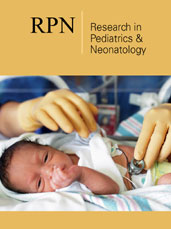- Submissions

Abstract
Research in Pediatrics & Neonatology
Assessment of Some Cognitive Disorders in Preterm Infants
-
Open or Close Emad M Hammad1, Ahmed El-Abd Ahmed2* Nagwan I Rashwan2 and Marwa G Fahem3
1Department of Paediatrics, Assiut University, Egypt
2Department of Paediatrics, South Valley University, Egypt
3Department of Paediatrics, Nag-Hammady hospital, Egypt
*Corresponding author: Ahmed El-Abd Ahmed, Pediatrics Department, Faculty of Medicine, South Valley University, Egypt
Submission: September 26, 2017; Published: March 12, 2018

ISSN : 2576-9200Volume1 Issue5
Abstract
Globally, prematurity is a major cause of death and a significant cause of long-term loss of human potential amongst survivors all around the world. Complications of preterm birth are the single largest direct cause of neonatal deaths, responsible for 35% of the world’s 3.1 million deaths a year in almost all countries with reliable data. Preterm birth rates are increasing. An estimated 15 million babies are born too early every year. That is more than 1 in 10 babies. Almost 1 million children die each year due to complications of preterm birth. In addition to its significant contribution to mortality, the effect of preterm birth amongst some survivors may continue throughout life, impairing neuro developmental functioning through increasing the risk of cerebral palsy, learning impairment and visual disorders and affecting long-term physical health with a higher risk of non-communicable disease. The aim of this work is to assess the effect of prematurity on cognitive development in preterm infants at the first year of life and to evaluate the difference between preterm and full term regarding this development. This could help to maximize neurological development and reduce long term cognitive and behavioral problems. Forty -three premature infants (26 female and 17 male) were studied. Twenty-five full term infants of matched age and sex were included in the study as controls. All patients were neurologically free on clinical examination. Anthropometric measurement of patients were recorded at 3, 6, 9, 12 months old and included weight, recumbent length and head circumference. The Griffiths development scale was used to assess the cognitive and psychomotor development status of the infants. They covered locomotor skills, personal/social skills, hearing/speech, eyehand coordination, and cognitive performance .Total intellectual quotients (IQ %) were calculated. The IQ of the studied patients at three months ranged from 61-132% (mean 103.63±14.90), at six months ranged from 51-140% (mean 112.43±22.10), at nine months 40-141% (mean 115.56 ± 27.92) and at twelve months ranged from 95-140% (mean 130.64 ± 14.06). Performance was the most affected parameter in preterm infants, also there was positive correlation between gestational age and IQ % at 6 and12 months, no correlation was found between IQ% and head circumference and IQ% at 6 and 12 months was higher than at 3 and 9 months in preterm infants.
Conclusion: Preterm infants have lower IQ scores than full term ones but this delay seems to resolve gradually with age, and at the end of the first year of life they become equal. In spite of the technological advances in neonatology and increased survival of preterm infants, there are still knowledge gaps in this area.
 a Creative Commons Attribution 4.0 International License. Based on a work at www.crimsonpublishers.com.
Best viewed in
a Creative Commons Attribution 4.0 International License. Based on a work at www.crimsonpublishers.com.
Best viewed in 







.jpg)






























 Editorial Board Registrations
Editorial Board Registrations Submit your Article
Submit your Article Refer a Friend
Refer a Friend Advertise With Us
Advertise With Us
.jpg)






.jpg)














.bmp)
.jpg)
.png)
.jpg)










.jpg)






.png)

.png)



.png)






